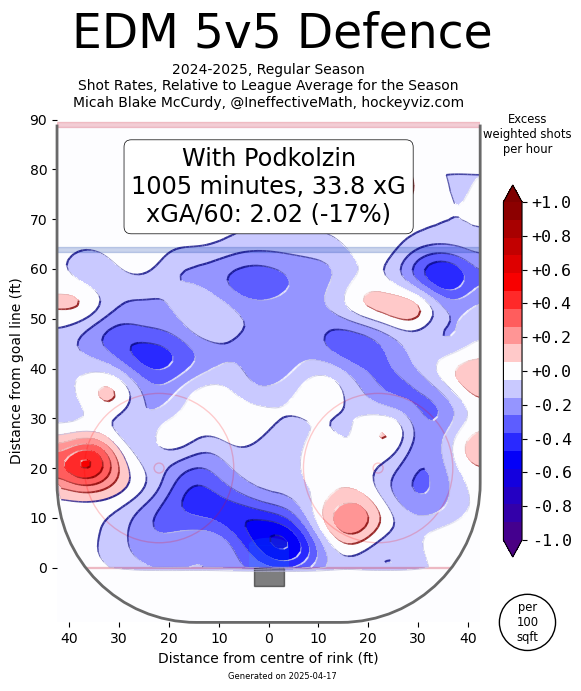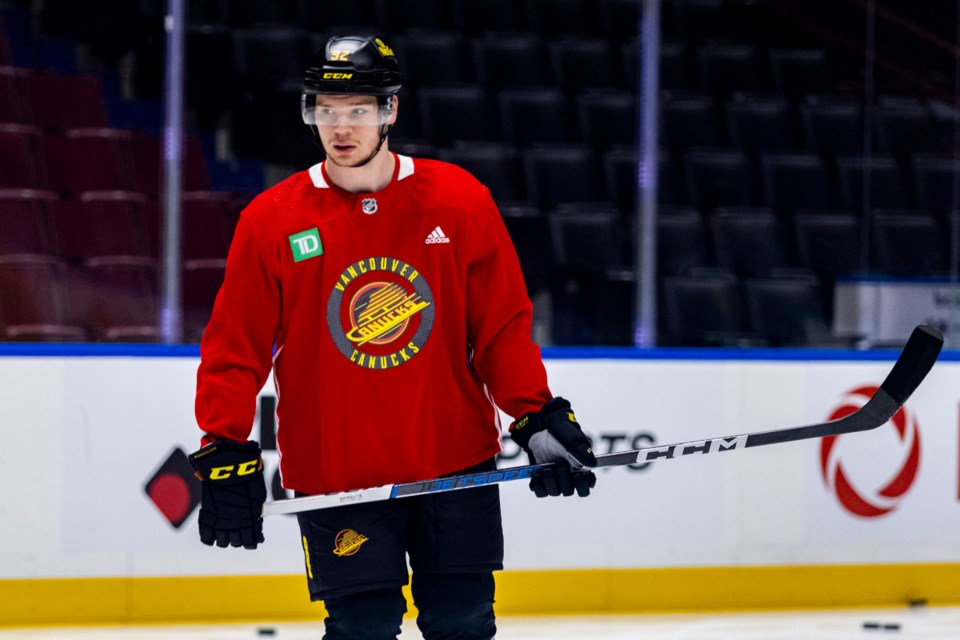As the Florida Panthers and Edmonton Oilers head into the Stanley Cup Final, a few former members of the Vancouver Canucks are going with them.
The Panthers have three former Canucks — or Canucks prospects — on the roster: Gustav Forsling is eating up minutes on the top pairing, Nate Schmidt has 3 goals and 7 points from the third pairing, and Jonah Gadjovich has chipped in a couple of goals from the fourth line.
At this point, there’s no use lamenting the loss of any of those three players from the Canucks. Trading Forsling for Adam Clendening was a disaster, but it happened over a decade ago. Besides, he was traded again by the Chicago Blackhawks to the Carolina Hurricanes and eventually put on waivers and claimed by the Panthers, where he finally found his footing.
Schmidt flat-out didn’t like playing in Vancouver and wanted out. As for Gadjovich, he’s a decent enough role player, but it’s not worth losing sleep over losing him on waivers four years ago.
The Canucks' summer Podkolzin trade
The Oilers also have a couple of former Canucks: Troy Stecher and Vasily Podkolzin.
There’s a strong argument to be made that the Canucks never should have let Stecher go. They didn’t qualify him as a restricted free agent in 2020, letting him become an unrestricted free agent. Both he and Chris Tanev left in the same offseason, with general manager Jim Benning replacing them with Schmidt and Travis Hamonic, which went poorly.
But that was five years ago, and there isn’t much point relitigating the Benning era — it was bad! — and Stecher subsequently bounced around between teams for a few years before landing with the Oilers.
Podkolzin, on the other hand, departed from the Canucks much more recently.
Last August, the Canucks traded Podkolzin to the Oilers for a fourth-round pick. That’s a significant drop in value for the 10th overall pick from the 2019 NHL Entry Draft, and it did not speak well of the Canucks’ prospect development system, which had been a cause for concern for years.
Podkolzin then stuck with the Oilers out of training camp and played all 82 games of the regular season after playing just 19 games with the Canucks the year before.
Now, Podkolzin has a chance to hoist the Stanley Cup less than a year after the Canucks traded him for a pittance.
With that in mind, many fans have argued that the Canucks gave up on the 23-year-old winger too soon. Is that the case?
Well, yes. Trading someone who played 82 games for a Stanley Cup contender and only getting a fourth-round pick back isn’t great. But it’s important not to overstate the issue.
Podkolzin doesn't need to be a star in Edmonton
While Podkolzin played in all 82 games, he had just 8 goals and 24 points, which isn’t overly impressive. In the playoffs, he has 1 goal and 6 points in 16 games.
That’s despite his most frequent linemate at 5-on-5 being Leon Draisaitl. It’s almost impressive to tally so few points while playing over 500 minutes with someone like Draisaitl, who had 52 goals and 106 points in 71 games this season, finishing first in goals and third in points in the NHL.
But that’s the key for why Podkolzin has worked in Edmonton. The Oilers don’t need Podkolzin to score. They’ve got that covered already.
Instead, Podkolzin brings other elements to the table, such as a strong defensive game and physicality on the forecheck. Podkolzin led the Oilers in hits in the regular season with 211, which ranked 20th among NHL forwards, he was one of the Oilers’ most effective penalty killers, and he was on the ice for the lowest rate of shots against at 5-on-5 among Oilers forwards.

So yes, the Canucks gave up on Podkolzin too soon, perhaps because they were viewing him through the lens of being a top-ten draft pick.
If Podkolzin had been a free-agent signing, the Canucks would have been doing backflips if they had gotten those kinds of a two-way results out of a player with a $1 million cap hit. Consider that they just signed Drew O’Connor, who had about the same number of points and much worse defensive numbers, to a two-year contract with a $2.5 million cap hit.
It seemed the expectations were always far too high for Podkolzin in Vancouver, and it led to him constantly second-guessing his instincts and overthinking the game. He could have been fine on the Canucks as a bottom-six winger, throwing hits and killing penalties.
Canucks moved Podkolzin to make room for players they traded away
What makes the decision to move on from Podkolzin look even worse is who they replaced him with.
The Canucks ran out of room for Podkolzin on the roster after adding a few wingers in free agency. Instead of potentially losing Podkolzin for nothing on waivers during the preseason, the Canucks got ahead of things by trading him to the Oilers a month before training camp.
Two of those new wingers worked out pretty well — Jake DeBrusk and Kiefer Sherwood — but two others didn’t work out at all: Danton Heinen and Daniel Sprong.
Heinen was a massive disappointment this past season. Expected to be a versatile winger who could play up and down the lineup, he primarily played down the lineup on the fourth line, as he couldn’t find any chemistry with either J.T. Miller or Elias Pettersson. Eventually, he was moved to the Pittsburgh Penguins as part of the Marcus Pettersson trade.
Sprong was a reasonable bet for the Canucks to make, signing the mercurial winger to a cheap, one-year deal in hopes he could figure things out defensively under Rick Tocchet. It’s a move that was seemingly low-risk, high-reward, with it easy enough to cut ties with Sprong if things didn’t work out.
Sure enough, Sprong wasn’t a fit and was jettisoned to the Seattle Kraken a month into the season. Only, the risk wasn't anything to do with Sprong; adding him to the roster arguably cost the Canucks Podkolzin.
The Canucks’ winger depth, which had looked so strong in the summer, evaporated in a hurry, and the Canucks really could have used someone like Podkolzin.
That’s the issue: the Canucks didn’t even give Podkolzin a chance to earn the job in training camp.
If the Canucks had waited a little longer, maybe they would have seen that Sprong’s defensive game was still non-existent and that Podkolzin was a better bet.
Even if Podkolzin didn’t win a job in training camp, that could’ve still been fine. Maybe the Canucks could have still traded Podkolzin. Maybe they could have snuck him through waivers on a busy day when other teams were just trying to get their rosters set and cap compliant. Maybe they would have lost Podkolzin on waivers, but that only would have meant missing out on the mystery box of a fourth-round pick.
Does any of this matter?
Look, it’s not the end of the world that the Canucks traded Podkolzin and he’s found a fit with the Oilers. It certainly looks bad for the Canucks after their disastrous season, but Podkolzin likely wouldn’t have made much of a difference; it’s more likely he would have been dragged down with the rest of the roster.
Still, there are lessons to be learned, whether it’s about properly evaluating a prospect’s strengths and weaknesses, being patient with development, or the importance of forward depth, especially when you’re taking a risk on players that might not work out.
Trading Podkolzin was a mistake, sure, but it’s far from the most costly mistake the Canucks have made in the past few years. Was it one of the thousand cuts that helped kill the Canucks this past season? Perhaps. But there were larger death blows along the way.




